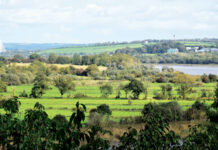Landscape cost estimating specialist, Colm Kenny explains how weaknesses and inconsistencies in planning requirements from local authorities are damaging the sector and the landscape
The Irish landscape contracting industry is a still in its infancy, having only sprouted in the early 1960s, with the seeds being sown by pioneers such as Sir Basil Goulding and early contracting companies like Power’s of Waterford. They paved the way for the modern-day contractors by influencing architects, developers and others of the importance of landscaped spaces and softening of new developments with tree and shrub planting.
While the design of these early schemes would have largely been the vision of contractors, the involvement of local authority planning departments and associated protocols meant a formal approach to landscape design was required. This, in turn, laid the foundation for the modern day planning process, which requires a landscape masterplan submission prior to planning permission being granted and which is responsible for the vast majority of commercial landscaping activity.
The guidelines set out on local authorities’ websites regarding valid planning applications make some reference to the obligation of a landscape plan for new developments; however, the reality is that the imposing of such requirements upon applicants and level scrutiny of submissions differs greatly from county to county. While one local authority will consistently request a landscape plan for every development, be it a one-off house or large commercial development, a neighbouring council may only request a landscape plan for larger projects and even at this, the request could be dependent on the attitude of the individual planner. Once a plan has been submitted it often seems it’s a tick the box exercise for most, with only a limited number of local authorities with a dedicated parks department having the expertise to inspect and evaluate landscape drawings.
This inconsistent approach to dealing with landscape plans causes problems for all parties, from the design team all the way down to the landscape contractor and on to the end user of the developments. From a design team point of view, the lead agent is more often than not the architect, who appoints a range of specialist engineers, a quantity surveyor, M & E co-ordinators, a planning consultant, a fire consultant…but when it comes to appointing a landscape architect or designer, its often a “wait and see approach” that is taken before such an appointment is made. When a landscape architect is employed early in the design phase, their influence can have a positive impact on the development by ensuring the landscape is a key consideration throughout the process, leading to successful landscape schemes for the benefit of everyone.
I have yet to come across a new development where there is no requirement for landscaping or external works. For every new build, there is always hard or soft landscaping required. For larger projects, a qualified landscape architect will be appointed as part of the design team. However, for smaller projects, the architect will take it upon themselves formulate a landscape design by colouring up their drawings and draw a few circles indicating the proposed position of the first tree that appears on Google. The problem arises when the contractors go about building the design and find out that the tree specified is only found on the internet and certainly not in any Irish nursery.
This acceptance of tolerating unqualified professionals to provide landscape plans needs to be curtailed and discouraged from continuing in order to improve the industry. An architect wouldn’t design and sign off on a foundation design for a new apartment block, yet they often take the liberty of designing a landscape scheme, which can sometimes be more complex than some foundations if seen on building sites over the years. Only when qualified landscape architects and designers take control and champion the cause will the situation improve for all parties in the industry.
“This acceptance of tolerating unqualified professionals to provide landscape plans needs to be curtailed and discouraged from continuing in order to improve the industry”
They are the ones who design schemes that work, they are the ones who can ensure high standards on the contracting front, they are the ones who know when contracts are carried out as per specifications.
The primary source of conflict and frustration within the industry is the prevalent practice of contractors completing contracts not up to specification, particularly with regard to soft landscaping. This occurs for a number of reasons. Often the budget has been spent and as a result, it’s the landscape budget that is seen as an area where cost savings can be made. The original designer may not be involved in the site works and so a few shortcuts are taken in order to get the job back on budget. Maybe the design team doesn’t understand how trees and plants are specified and the difference between a 14-16cm and a 20-25cm tree or indeed the difference between a Betula pendula or a Quercus ilex. The architect, quantity surveyor and/or site clerk.
They just see 1 No. tree and they are happy with that. If a competent landscape architect is employed to see a project through, they act as the safety net to ensure the design is fully compliant with their vision.
A simple solution to such practices would be the introduction of a certification scheme. There has been a lot of discussion in the general construction industry since the introduction of the Building Control (Amendment) Regulations 2014 which came into effect 1st March 2014. These regulations are currently under review regarding one-off dwellings but for all other types of developments, the regulations require owners to appoint a design certifier to designs and an assigned certifier to the actual works to new buildings. As the title of a landscape architect is not a protected title under the Building Control Act, they are not qualified to act as assigned certifiers under the legislation. In other words, the people that are qualified to sign off on landscape schemes are not able to highlight the regard the profession is held in by the decision makers. Instead, they can only advise architects and other certifiers if a scheme is up to standard. That is of course if they are involved at that stage of the project at all.
I recently worked on a small commercial project where there were 175 inspections carried out by the architect in order to complete the certification process. This included visually inspecting everything from the underside of the foundations to the top of the roof, but not the 40 odd heavy standard trees that were planted outside on the street at a considerable cost. These were not certified as there is no requirement to do so even though they were included on the planning drawings, and in the granting of the planning permission, one of the conditions stated that the landscape plan was to be implemented in full in order to reduce the visual impact of the scheme. There is a major flaw in the regulations, which in my opinion need to be changed for the good of the industry and local landscapes. Only when landscape architects are required and empowered to sign off on schemes will the situation change of us all.
It is clear that in order to improve conditions in all sectors, standards of work and the perception of our small industry within the bigger construction family will need to change. Efforts have been and continue to be made to rectify this damaging situation, but more needs to be done. We need to make our dissatisfaction known to local authorities, planners, architects, developers and clients. We need to clearly demonstrate the harm being done and the negative financial and environmental repercussions of what is essentially a weak and inconsistent system. One thing is for sure, no one else is going to do it for us. ✽
  |










